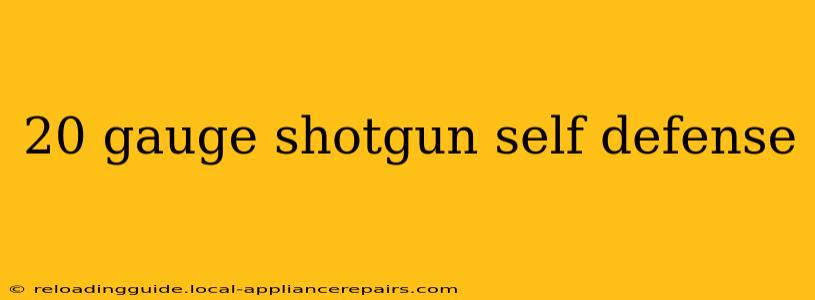The 20 gauge shotgun has carved a niche for itself in the world of self-defense, offering a compelling alternative to its larger 12-gauge counterpart. While not as ubiquitous, understanding its strengths and weaknesses is crucial for anyone considering it for home protection. This comprehensive guide delves into the 20 gauge shotgun's suitability for self-defense, exploring its advantages, disadvantages, and crucial factors to consider.
Advantages of a 20 Gauge Shotgun for Self-Defense
The 20 gauge boasts several advantages that make it a viable option for home defense:
-
Reduced Recoil: This is arguably the most significant advantage. The lighter recoil makes it easier to handle, especially for individuals with less upper body strength or those new to firearms. Faster follow-up shots are also possible due to the reduced recoil. This is critical in a high-stress self-defense situation.
-
Lighter Weight: A 20 gauge shotgun is generally lighter than a 12 gauge, making it easier to maneuver and carry around the house. This is particularly beneficial for those needing to quickly react to a threat. The reduced weight also minimizes fatigue during extended periods of use.
-
Reduced Noise: While still loud, the 20 gauge typically produces a slightly less intense report than the 12 gauge. This can be advantageous in close-quarters situations where excessive noise might be a concern (though hearing protection is always recommended).
-
Manageable for Smaller Individuals: The lighter weight and reduced recoil make the 20 gauge a more manageable option for individuals with smaller builds, enhancing their ability to effectively wield the weapon in self-defense.
-
Ample Ammunition Options: While perhaps not as expansive as the 12 gauge, a good variety of 20 gauge self-defense ammunition is readily available, including buckshot, birdshot, and slugs, allowing for customized load selection based on specific needs and environments.
Disadvantages of a 20 Gauge Shotgun for Self-Defense
Despite its merits, the 20 gauge does present some drawbacks:
-
Less Stopping Power: Compared to a 12 gauge, the 20 gauge delivers less stopping power, meaning it might require more precise shot placement to neutralize a threat. This difference can be significant depending on the ammunition type and the target's size and build.
-
Penetration Concerns: While penetration is always a concern with any shotgun, the reduced stopping power of the 20 gauge might lead to a greater need for precise shot placement to prevent overpenetration and risk harming unintended targets.
Ammunition Considerations for Self-Defense
Choosing the right ammunition is paramount. Buckshot is a popular choice for home defense due to its pattern spread, but its penetration potential must be carefully considered. Birdshot offers less stopping power and penetration, making it unsuitable for self-defense in most scenarios. Slugs provide the greatest range and penetration but a tighter spread. Carefully research and choose ammunition suited for your specific needs and home environment.
Choosing a 20 Gauge Shotgun for Self-Defense: Key Considerations
-
Shot Capacity: Consider shotguns with higher capacity magazines for faster follow-up shots.
-
Ergonomics: Ensure the firearm fits your hand comfortably and allows for easy manipulation of the safety and controls.
-
Reliability: A reliable firearm is essential in a high-stress situation.
-
Training: Proper training is vital to effectively and safely use any firearm, including a 20 gauge shotgun.
Conclusion
The 20 gauge shotgun represents a viable self-defense option, particularly for individuals who find the recoil of a 12 gauge too forceful. However, it’s crucial to understand its limitations and carefully consider the ammunition selection and training required for responsible and effective use. Always prioritize safety and legality when considering any firearm for self-defense purposes. Remember to check your local laws and regulations regarding firearm ownership and usage before making any purchase. This information is for educational purposes only and should not be considered legal or professional advice. Consult with a firearms expert and your local law enforcement for further guidance.

